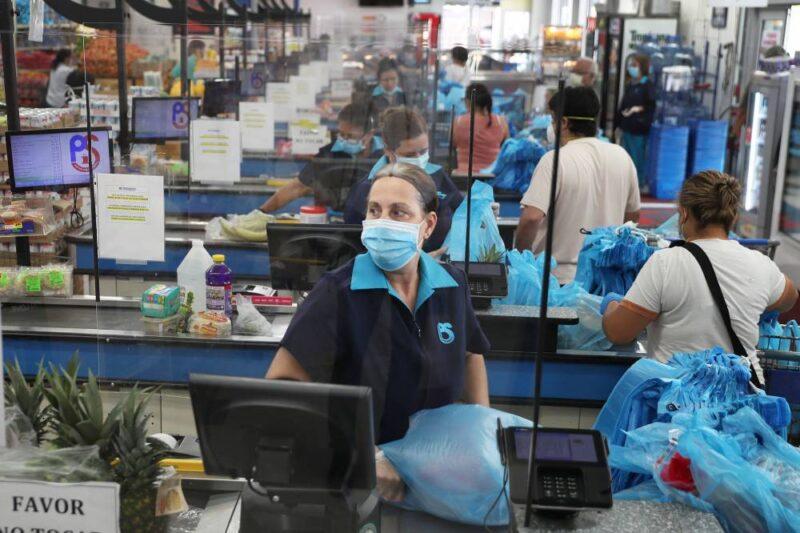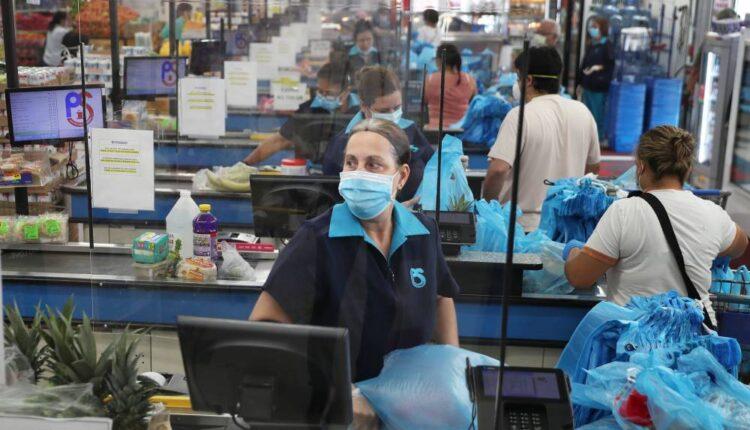
- Retail sales for March fell off a cliff after states issued stay-at-home orders to prevent the spread of the coronavirus.
- According to Dow Jones, March sales are expected to have fallen by 8% month over month, the largest decline ever.
- "It's understandable. The country is sitting at home. They can't go out and play and spend like they used to. These numbers are going to look pretty bad," said one economist.
Lay Guzman stands behind a partial protective plastic screen and wears a mask and gloves as she works as a cashier at the Presidente Supermarket on April 13, 2020 in Miami, Florida.Joe Raedle | Getty Images
When the economy shut down, consumers also shut down.
Despite hoarding of groceries, toilet paper and other necessities, the abrupt drop in consumer spending last month at restaurants, stores and gas stations is expected to have resulted in the largest decline ever in monthly retail sales, according to Diane Swonk chief economist at Grant Thornton.
Economists expect a decline of 8% in March retail sales, according to Dow Jones. That compares to a half percent decline in February. If autos are excluded, sales were expected to be down 5.2% in March.
The retail sales data, expected at 8:30 a.m. ET Wednesday, is one of the most important readings of consumer activity. The consumer makes up about 70% of the U.S. economy and since mid-March, many Americans have been at home.
Many have lost their jobs with 17 million workers filing for unemployment over the three weeks ending April 4.
"The risk is to the downside," Swonk said. "We could get worse than we are expecting. As things shut down, people are also pulling in."
Swonk said the retail sales number in April is likely to be even worse since more Americans will have been shut in their homes for the entire month and millions more could have lost their jobs. Vehicle sales fell 33% in March, but Swonk said they could be next to nothing in April.
"It's a day of reckoning for the economy," said Chris Rupkey, chief financial economist at MUFG Union Bank. "We already have auto sales for the month of March. They fell from 16.7 million annual rate in February to to 11.4 million annual rate in March. … They're 20% of retail sales."
Rupkey said the pickup in activity in online shopping at grocers, Amazon and other retailers could have increased but not enough to make up for the bulk of normal activity.
"The category is non-store retailers and it's about 10% of retail sales. It's a big chunk. It's been growing over time. That could go up. It must be going through the roof now," he said.
Grocery store sales, a little over 10% of February retail sales, could also have risen in March, as consumers stocked up on food and cleaning supplies.
Swonk said consumers were already pulling in the reins, prior to the virus outbreak, despite a very strong labor market through February.
"The bottom line is, it's not been a terrific retail season. We had unseasonably warm winter weather. Clothing did not do great. Even though we had a good job market, it was not a good beginning of the year," Swonk said, adding the Christmas season was also not that strong.
Economists expect that the mandated shutdowns by many states to stop the spread of the coronavirus has resulted in a sharp, sudden recession. In second quarter, the economy is expected to contract by 30% or more, before turning positive in the third quarter as the economy reopens.
"People throw up these horrendous numbers. Then we're even surprised, they're more terrible," said Rupkey. "It's understandable. The country is sitting at home. They can't go out and play and spend like they used to. These numbers are going to look pretty bad."
Source: cnbc.com

